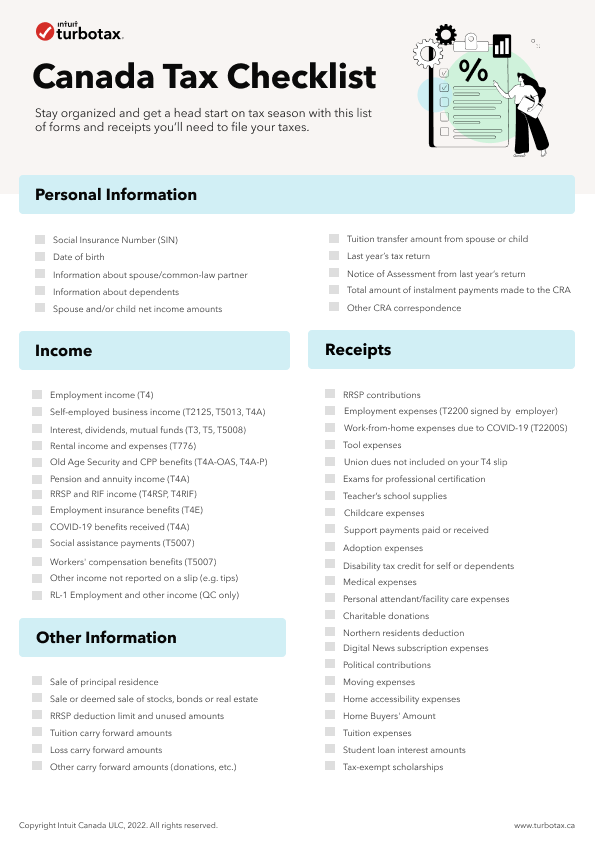Taxes for New Canadians: Step-by-Step Guide to Filing Your Tax Return
TurboTax Canada
August 2, 2023 | 7 Min Read
Updated for tax year 2025

Key Takeaways
-
For first-time tax filers, you’ll need to gather all your key documents, report all sources of income, and apply tax deductions and tax credits in your T1 General.
-
The tax filing deadline is April 30, 2025 for personal taxes and June 15, 2025 for the self-employed (however, if you owe self-employed taxes, that payment is due by April 30, 2025).
-
After you file your tax return, you’ll receive your Notice of Assessment (NOA) from the Canada Revenue Agency (CRA) to confirm your submission has been processed.
When do I file my taxes in Canada?
Winter, spring, summer, fall… you might think there are 4 seasons in Canada. But there’s one more to add: tax season.
For personal taxes, or if you run a business that’s not a corporation, the income tax year matches the calendar year: January 1 to December 31. Then, the following spring, you have to do what’s called “filing your taxes” or “completing your tax return.” This means filling out an income tax return and sending it to the Canada Revenue Agency (CRA). New Canadians are required to fill out the T1 General form, which summarizes your income and taxes withheld.
As you're new to Canada, there are some tax deadlines to pay attention to (so you know when the final day is to file).
-
Personal income tax deadline: The personal income tax filing deadline is April 30, 2025.
-
Self-employment tax deadline: If you or your spouse or common-law partner have self-employment income, the filing deadline for self-employed income is June 15, 2025.
-
Deadline for taxes owed: Whether filing a personal or self-employed return, if you owe income tax to the government, you still have to pay the amount by April 30, 2025—even if you don’t file your self-employed taxes until June. This helps to avoid interest and penalties.
-
Weekend blackout: If deadlines fall on a Saturday, Sunday, or a statutory holiday, the deadline gets pushed to the following Monday.
-
Tax-filing date for new Canadians: When should those who are new to Canada file their taxes for the first time? Usually, on or before the filing deadline for the year when they become a resident for tax purposes. For instance, if you moved to Canada in July 2024, you would file your first tax return by April 30, 2025. You may also be eligible to apply for some benefits and credits earlier than that.
Note: If you file your return after the deadline, you may have to pay penalties and interest on any amounts owing.
What is the impact of residency on taxes?
In Canada, your income tax responsibilities depend on your residency status. Determining your residency is essential to understanding your tax obligations and filing requirements. Here's an overview of the criteria and the tax implications.
New Canadians
Those who are new to Canada can fall into the following categories:
- Permanent residents. Includes individuals who have received "approval-in-principle" from the department of Immigration, Refugees, and Citizenship Canada (IRCC) to remain in Canada.
- Refugees. Recognized as protected persons.
- Temporary residents. Includes those holding student visas, work permits, or temporary resident permits.
The CRA considers you new to Canada during your first year as a resident.
Canadian residents
According to the CRA, you're considered a resident for tax purposes when you establish significant residential ties in Canada. These ties most often happen on the date when you arrive in Canada. Examples of significant residential ties include:
- establishing a home in Canada
- having a spouse or common-law partner in Canada
- having dependants (such as children) in Canada
If you're a resident of Canada, you should file an income tax return for either the entire tax year or the part of the tax year you've lived in Canada.
Checking your status
If you're unsure about the exact date you officially became a resident, the CRA offers the NR74 Determination of Residency Status (Entering Canada) form, which you can complete and submit. The CRA then issues a decision letter with a date they consider you became a resident of Canada. That date would be the starting date you would use to file your income tax return. You can find more information about the residency criteria from the CRA's website.
What information is needed to file a tax return in Canada?
Generally speaking, to do your taxes, you'll have to provide basic personal information, such as your full legal name, your address, and all income from the previous year on your T1 General form.
To prepare for filing your tax return in Canada, here are some other important things to note:
Social Insurance Number (SIN)
- Make sure you have your Social Insurance Number, which is used to identify you for income tax and benefits.
- Your income, tax returns, tax credits and benefits are documented with your SIN.
- Those new to Canada need a SIN to file their taxes and to open a bank account.
- You'll notice that temporary residents have a SIN that starts with the number “9” linked to their permit.
- If you don't have a SIN, you can apply by visiting a Service Canada centre in person or online. You'll need proof of identity and residency (such as a PR card or a work/study permit).
Tax slips
- If you're employed in Canada, you'll receive a slip from each employer you worked for during that tax year. The slip is called a T4 – Statement of Remuneration Paid. You should receive it from your employer(s) by the end of February.
- You may have other tax slips, such as a T5 for investment income, a T3 for trust income and allocation, or a T2202 for education and textbook expenses.
- TurboTax includes a feature called Auto-fill My Return (AFR) to help you fill out your return with ease.
Dependants
- If you have dependants—a spouse, children, or elderly parents—you'll have to provide all of their details to claim tax credits that you may be eligible for.
Tax credits
You can claim tax credits and deductions depending on your tax situation. For example:
- If you have child-care expenses, you may be eligible to claim those on your return.
- If you paid medical expenses for yourself, your spouse, or your children, you may be able to claim those as well. (Make sure you have official receipts!)
- There's also the Goods and Services Tax/Harmonized Sales Tax (GST/HST) credit to help cover the tax you pay when buying products or services.
- TurboTax has expense tools that will add up your tax credits and deductions. Plus, it can recommend which spouse should claim the deduction on their return.
Reporting income
- If you recently arrived in Canada, you must include information about income you earned before arriving.
- If you received employment income from outside Canada after the day you relocated, you'll need those numbers as well.
- In some cases, any income you have earned from outside of Canada may be exempt from tax in Canada due to a tax treaty with your previous country. You must still report the income on your tax return. You can deduct the exempt part on line 25600 of your tax return.
Reporting foreign assets
- If you have foreign assets over $100,000, you'll need to report them on Form T1135 on your tax return. They may include shares or stocks, gifts, inheritance, and property that doesn't produce income.
- If you're bringing any kind of assets to Canada, you'll need to include details and market value on the day you arrive. Your capital gains or losses will be calculated based on this amount, if and when you sell them.
For Quebec residents
- You must file a tax return with Revenu Québec as well as the T1 General. (Quebec is the only province in Canada where you need to file two tax returns.)
- TurboTax makes it easy to file both federally and provincially for Quebec residents.
[image embedded: The only tax checklist you need Download checklist]

The only tax checklist you need
Get organized and tackle your taxes like a pro. This tax checklist tells you everything you need to file your 2023 return on time and accurately.
Download checklist
What are the steps for filing a tax return?
It might seem like a lot, but going through the tax-filing process yourself isn't that hard. It all comes down to these 4 steps:
- Gather all your documents. Pull together all the information you need, as listed above.
- Choose how to file your taxes. If you want to mail your tax return, request a copy of the paper filing package from the CRA. If you're a first-time filer, TurboTax can also be used to prepare and print a return to mail in. In addition, TurboTax works with NETFILE to prepare and submit your return.
- Complete the CRA tax forms. If you're working on paper, be sure to double-check your math! If you're doing your taxes online be sure you've included all your income, deductions, credits, and expenses.
- Send in your tax return by the deadline. Once the CRA has processed your return, you'll receive a Notice of Assessment (NOA), which outlines its conclusions and gives you important information on your tax situation. It also lets you know whether you owe money or will receive a refund. Keep this CRA tax document somewhere safe—you'll need it again in the future.
How do I file my taxes for the first time?
If you're a non-resident, you're required to file your tax return (which includes your T1 General) as you'll be subject to pay income tax on income you earned in Canada. Non-residents will need to submit their tax return by mail.
If you're a Canadian resident, you must report your worldwide income from all sources earned to the CRA on your T1 personal income tax filing. Also, even if you didn't receive income during the year, you should still file a return so that the CRA can determine if you're eligible for any benefits.
Being new to Canada, you have the choice to file your return electronically or by mail—if it's your first income tax return to the CRA.
Create a CRA My Account
Once you've completed the income tax return filing process, you'll be able to use that information to complete your registration and access your CRA My Account. This online system helps you track and maintain your tax information and communicate with the CRA.
Here are the steps to set up an account:
- Start registration. Go to the CRA My Account registration page and select “Register for My Account.”
- Verify your identity. Provide your SIN, postal code, date of birth, and details from your previous year's tax return.
- Set up login. Create a user ID (that's memorable) or register using a Sign-In Partner, such as your bank login.
- Secure your account. Form security questions and answers to protect your account.
How to file an income tax return electronically
Here are the steps to set up electronic tax filing:
- You can use NETFILE, an electronic tax-filing service, which allows you to use various approved software (like TurboTax) to submit your return directly to the CRA online.
- You can use TurboTax's Full Service package and hand off your taxes to a TurboTax expert to electronically file your return. You can choose from different levels of service based on your needs.
It's best to check that you meet the eligibility criteria for NETFILE. Visit the CRA NETFILE eligibility page for information about certain restrictions.
How does my residency status affect reporting foreign income in Canada?
Based on your residency status, here is some key information you should know about reporting your foreign income.
Before coming to Canada
Any foreign income you earned before you arrived in Canada is not subject to Canadian taxes. However, you still need to declare it to calculate your tax credits.
Non-residents and temporary residents
Typically, non-residents and temporary residents only report Canadian-sourced income.
Once you become a Canadian resident
Being a Canadian resident usually means you have a home, family members, or dependants in Canada. Once you're a Canadian resident, for tax purposes, you have to declare all income from anywhere in the world on your tax return.
How do I declare foreign income in Canada?
In addition to reporting your foreign income you may need these key tax forms:
- Form T1135 for foreign property greater than $100,000 for Canadian residents. This includes bank accounts, stocks, bonds, and real estate.
- Form T1134 for those who have interests in foreign affiliates, such as a non-resident corporation or non-resident trust.
If you declare foreign income on a Canadian tax return:
- indicate the country the funds came from
- declare the full amount of any income (that is, the amount before foreign taxes were withheld)
- convert the foreign currency to the Canadian dollar, you can use the Bank of Canada's exchange rate
In some cases, income you earned from a country other than Canada may be exempt from tax in Canada due to a tax treaty. But you must still report the foreign income on your tax return. You can deduct the exempt part on line 25600 of the form.
What to do after filing your taxes
As new Canadians, there's a few things you need to do after filing your tax return. First, you'll wait for your NOA, which confirms your return has been processed.
You're probably wondering how long it takes after filing taxes to get a refund. Well, refunds typically arrive within 2 weeks for online submissions, 8 weeks for paper returns, and 16 weeks for non-resident returns.
Adjusting your tax return after filing
If you need to adjust your tax return after filing due to an error, you can request changes through CRA's My Account or by mail. TurboTax Assist & Review simplifies this tax-filing process by connecting you with tax experts who can help answer your questions.
For added peace of mind, TurboTax's Audit Coach and Extended Expert Coverage provides guidance if the CRA reviews your return. It's available for the 2024 tax year return until December 2027.
Do people claiming asylum in Canada need to pay taxes?
Yes, those seeking asylum need to pay taxes in Canada. These individuals, known as refugees, are seeking protection in Canada because their own country is no longer safe.
The income tax refugees pay depends on how much money they make. Becoming familiar with the Canadian tax brackets and corresponding tax rates can help. Also, where a refugee lives and any tax deductions or credits they apply for can impact their taxes.
Let a TurboTax expert help you with filing your first tax return.
TurboTax makes every step—from filing to follow-ups—easier during tax season
Let an expert take taxes off your plate
Have a dedicated tax expert handle everything, from start to finish.
Get StartedContents
What is the impact of residency on taxes?
What information is needed to file a tax return in Canada?
What are the steps for filing a tax return?
How do I file my taxes for the first time?
How does my residency status affect reporting foreign income in Canada?
How do I declare foreign income in Canada?
What to do after filing your taxes
Adjusting your tax return after filing
Do people claiming asylum in Canada need to pay taxes?
Let a TurboTax expert help you with filing your first tax return.
Related articles

© 1997-2024 Intuit, Inc. All rights reserved. Intuit, QuickBooks, QB, TurboTax, Profile, and Mint are registered trademarks of Intuit Inc. Terms and conditions, features, support, pricing, and service options subject to change without notice.
Copyright © Intuit Canada ULC, 2024. All rights reserved.
The views expressed on this site are intended to provide generalized financial information designed to educate a broad segment of the public; it does not give personalized tax, investment, legal, or other business and professional advice. Before taking any action, you should always seek the assistance of a professional who knows your particular situation for advice on taxes, your investments, the law, or any other business and professional matters that affect you and/or your business.









